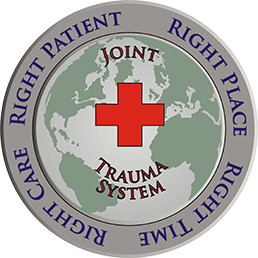JTS Leadership Honored for Outstanding Contributions to Combat Casualty Care
2017 was the Year of the Joint Trauma System (JTS). In addition to being officially funded by the National Defense Authorization Act 2017, the JTS leadership received recognition for distinguished service and outstanding contributions to the Combat Casualty Care.
DoD Distinguished Civilian Service Award
The wave of international acknowledgement started shortly before the 2017 New Year. The JTS Deputy Director received the highest civilian honor given by the Secretary of Defense during a ceremony at the Pentagon. Mary Ann Spott, Ph.D., was among eight Department of Defense (DoD) civilian employees who were awarded the Distinguished Civilian Service (DCS) Award by the Deputy Secretary of Defense at the 61st annual DoD DCS Award ceremony at the Pentagon. The DCS Award is the highest recognition DoD can award an employee. The exclusive few recipients have careers which reflect exceptional devotion to duty and significant contributions of broad scope of policy, scientific, technical or administrative fields that increase effectiveness and efficiency.
The award to Dr. Spott was the long-overdue recognition of a decade's dedication, personal and professional sacrifice in the service of the nation's Wounded Warrior. Spott joined the JTS in 2006 as the first director of the JTS to establish the DoD's first and only trauma system and trauma patient registry.
The Military Health System Distinguished Service Award
As the JTS Committee of Tactical Combat Casualty Care (CoTCCC) celebrated 20 years of advancing combat medic training this year, the military medicine community celebrated the lifetime accomplishments of its chairman CAPT Frank K. Butler, (USN ret), MD. The MHS presented Butler with the Distinguished Service Award. This lifetime achievement award recognizes an individual who contributed significantly to the success of MHS research and who demonstrates outstanding leadership.
Butler has been involved in medic training for 30 years and his influence is widespread. He has leveraged his prominent position as CoTCCC Chairman to ensure combat casualty care breakthroughs make their way to the civilian trauma care world. Butler has facilitated the research and testing of techniques, devices and pharmaceuticals for the purpose of improving trauma care to save lives of military and civilians. These include Transexamic acid (TXA) to prevent or reduce bleeding, CricKey, surgical cricothyroidotomy device to precisely secure an airway, XStat, an expandable, multi-sponge wound dressing, Celox hemostatic gauze and the proper use of tourniquets. Butler is largely responsible for putting first responder trauma care into the national spotlight with the Stop the Bleed campaign sponsored by the White House.
Major Jonathan Letterman Medical Excellence Award
The work of CAPT Frank K. Butler, (USN ret), MD was also honored by the National Museum of Civil War Medicine. The museum awarded Butler the 10th Annual Major Jonathan Letterman Medical Excellence Award which recognizes an individual, program, or organization that has made an exemplary contribution to civilian or military medicine–continuing the legacy of Dr. Letterman.
"In researching the career of Dr. Butler, it became obvious that he is indeed a 'Living Letterman,'" explains NMCWM Executive Director David Price, "Dr. Butler's accomplishments in the military, in the diving world, in ophthalmology and in civilian medicine are too numerous to list, however the singular achievement of his amazing career is conceiving and bringing to worldwide implementation of TCCC. He literally wrote the book on the guidelines to critical care in combat – just like Major Jonathan Letterman did during the Civil War. There are few more deserving of this award than Dr. Butler."
Military Surgical Volunteerism Award
The Board of Governors of the American College of Surgeons presented CAPT Zsolt Stockinger, the JTS Director, with the 2017 American College of Surgeons / Pfizer Surgical Military Surgical Volunteerism Award. He received the award for providing surgical care and training and developing surgical capacity while on voluntary deployment to austere environments.
As Chief of Trauma at the NATO hospital in Kandahar, Stockinger was instrumental in coordinating host nation care that led to the local Afghan Army hospital becoming the trauma center for both Afghan Army and civilian injuries in the region. In another instance, Stockinger worked with NATO and U.S. leadership, the Afghan Army surgeon general and Ministry of Health, and others to close the gap on trauma care in southern Afghanistan. Within six weeks Afghan surgical teams from Kabul were deployed to Helmand to operate in a tented facility. By the end of his tour, ground had been broken for a permanent facility and funding and equipment procured for the first-ever Afghan Army surgical facility in Southern Afghanistan, which still operates today. Stockinger was also involved in Haiti earthquake relief, and surgical training in many nations including Pakistan, the Philippines, and a number of former Soviet Republics.
"Dr. Stockinger has consistently volunteered himself for missions that will improve the delivery of care to patients from around the globe and is very frank about cutting to the chase to respond in a timely manner without all the frills. That is a very difficult thing to do, and not always popular, but among his staff, that is one quality they appreciate the most about him and these actions have made the difference in the lives of combat patients," said JTS Deputy Director Dr. Spott.
 An official website of the United States government
An official website of the United States government
 ) or https:// means you've safely connected to the .mil website. Share sensitive information only on official, secure websites.
) or https:// means you've safely connected to the .mil website. Share sensitive information only on official, secure websites.

